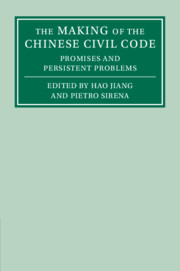Book contents
- The Making of the Chinese Civil Code
- The Making of the Chinese Civil Code
- Copyright page
- Dedication
- Contents
- Tables
- Contributors
- Preface
- Acknowledgements
- Abbreviations
- 1 The Making of a Civil Code in China
- 2 Personality Rights in China’s New Civil Code
- 3 Force Majeure or Change of Circumstances
- 4 Article 580 (2) of the Chinese Civil Code
- 5 Contractual Consent in the New Chinese Civil Code
- 6 The Security Interests in Chinese Law
- 7 Chinese Tort Law in the Era of the Civil Code
- 8 Causation in the Chinese Civil Code
- 9 The Aims of Tort Law across China and the West
- 10 Classifying the Passive Appreciation of Separate Property during Marriage in the Chinese Civil Code
- 11 The Rule of Law in Traditional China
- 12 The Private Law Influence of the Great Qing Code
- 13 The New Validity Rules in Chinese Civil Code and Chinese State-Owned Enterprises’ Freedom in Contracting
- 14 Chinese Civil Law and Soviet Influences
- 15 The Connections between Roman Law and Chinese Civil Law
- Index
13 - The New Validity Rules in Chinese Civil Code and Chinese State-Owned Enterprises’ Freedom in Contracting
One Step Too Far
Published online by Cambridge University Press: 31 August 2023
- The Making of the Chinese Civil Code
- The Making of the Chinese Civil Code
- Copyright page
- Dedication
- Contents
- Tables
- Contributors
- Preface
- Acknowledgements
- Abbreviations
- 1 The Making of a Civil Code in China
- 2 Personality Rights in China’s New Civil Code
- 3 Force Majeure or Change of Circumstances
- 4 Article 580 (2) of the Chinese Civil Code
- 5 Contractual Consent in the New Chinese Civil Code
- 6 The Security Interests in Chinese Law
- 7 Chinese Tort Law in the Era of the Civil Code
- 8 Causation in the Chinese Civil Code
- 9 The Aims of Tort Law across China and the West
- 10 Classifying the Passive Appreciation of Separate Property during Marriage in the Chinese Civil Code
- 11 The Rule of Law in Traditional China
- 12 The Private Law Influence of the Great Qing Code
- 13 The New Validity Rules in Chinese Civil Code and Chinese State-Owned Enterprises’ Freedom in Contracting
- 14 Chinese Civil Law and Soviet Influences
- 15 The Connections between Roman Law and Chinese Civil Law
- Index
Summary
This chapter provides a snapshot of the recent developments on Chinese security interest law. Several questions will be explored. Firstly, were there any needs for changes? Secondly, what are the recent changes? Thirdly, have these changes achieved the purpose? I will offer some critical reflections of the law in terms of clarity, simplicity, convenience, and fairness. Not only are the relevant background and statutory framework of the security interests explained, but its theoretical structure and several practical issues will also be discussed. For instance, where a loan has been secured by both a personal guarantee and a mortgage, in the absence of any agreement, will the creditor have a free choice on which one to enforce first? Another question to be addressed is in situations where more than two securities had secured a loan (including a personal guarantee and mortgages) on a joint and several liability basis, in the absence of any agreement, can a security provider indemnify from the others after it fulfilled its security obligation in case of the debtor’s insolvency ?
- Type
- Chapter
- Information
- The Making of the Chinese Civil CodePromises and Persistent Problems, pp. 269 - 291Publisher: Cambridge University PressPrint publication year: 2023

